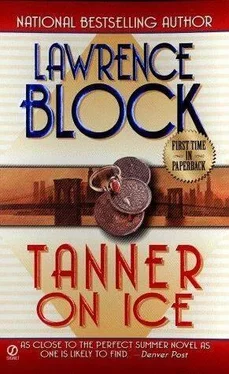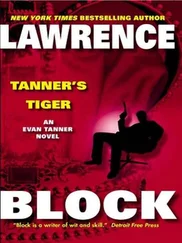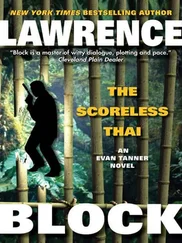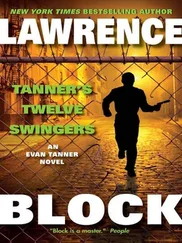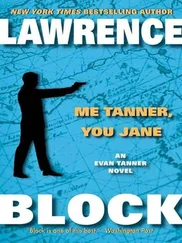“It would probably be best,” he said, “if he does not speak at all.”
“That’s what I thought, Ku Min.”
“He is tall,” he said. “That is a point in his favor. But, Evan, my friend, if one looks closely-”
“I hope nobody looks too closely.”
“His hands are small, you know.”
“Well,” I said. The nails were clipped short, and there was no polish on them, but we hadn’t been able to do anything about the size of Katya’s hands.
“And his aura,” he said.
“His aura?”
“Some people can see auras,” he said. “Especially monks trained in meditation. I cannot. But anyone can sense the energy of another human being, is it not so?”
“And your sense is…”
“That you and your male companion must be very careful, Evan. You should be all right on the boat. The captain is my friend, and the crew members know to take no interest in the passengers. Still, they could talk afterward, and word travels quickly.”
“I’ll try not to give them anything to talk about.”
“Yes. And when you leave the ship at Bagan-”
“We’ll be careful.”
“Yes. You will see other monks, Evan. There are monks everywhere. Be especially careful around them.”
“We will.”
“If I had known…”
“You’d have helped us just the same.”
“Yes,” he said. “But I would not have slept well. Good luck, my friend.”
I shook his hand, boarded the boat, and found the place in the hold where they’d made room for us. We’d be out of the crew’s way there, and out of sight of the people on the banks and the passing river traffic. I settled in next to Katya, my back braced against a burlap sack of rice. The boat started its engines, and I closed my eyes and breathed deeply, inhaling the rich smell of foodstuffs and other goods bound for Mandalay.
The cargo included a load of dried fish and a pile of hides, and their smells predominated, but there were other top notes to be detected, a whiff of this and a sniff of that. A hound dog would have had the time of his life.
We got underway. Katya was quiet for half an hour or so, and I thought she might be sleeping. Then her hand caught mine and she gave a squeeze.
“He knows,” she said. “Doesn’t he?”
“Who, Ku Min? Knows what?”
“You know. About me.”
“Doesn’t suspect a thing,” I said. “We fooled him completely.”
I’m not sure she believed me, but she relaxed, and the next thing I knew she was sleeping, curled up on one burlap sack and using another for a pillow. I closed my own eyes and tuned in to the motion of the boat and the thrum of its engines. I snacked on one of the cakes of sticky rice we’d brought along, and when Katya stirred I fed her one.
The ship sailed lazily upstream, stopping at little river ports to load and unload cargo. After one such stop around noon a crew member brought down lunch for us, twin paper cones of rice and vegetables. The food was greasy and salty enough to sink the spirits of a cardiologist, but it was tasty and we were both hungry. He didn’t seem to expect to be paid for it, either, or for the two bottles of beer he brought us.
Just like the airlines, I thought. Except the food on the boat was better.
After he was out of earshot, Katya held her bottle aloft and raised her eyebrows. “Beer,” she said. “And it is past noon, is it not?”
“You’d have to ask the little uniformed prick who took my watch,” I said. “I’d say it’s pretty close to noon.”
“The men on the boats, Evan. Do they know we are not true monks?”
“They know there’s something dodgy about us,” I said, “or they wouldn’t be smuggling us with the dried fish. As far as the beer is concerned, that may be a gray area for monks. I’m not completely sure. They may distinguish between distilled spirits and beer. The idea is to avoid intoxication. The beer in these countries is a whole lot safer than the water, and maybe they take that into consideration.”
“There’s no label on the bottle.”
“Well, I can see why. It’s not very good beer.”
“And there’s only one bottle for each of us.”
“It’s the standard complaint,” I said. “‘The food is terrible and the portions are small.’ I’m not sure if monks can drink beer or not. My guess is, nobody’s going to put it in our begging bowls.”
“Will we really go begging?”
“It’s what monks do. It has a different connotation when a monk does it; it’s not like being hit on by a child in Calcutta who’s been maimed by her parents so she’ll look more pathetic. A begging monk makes it possible for people to earn merit by putting some rice in his bowl. He’s performing a useful function.”
“I should look forward to it,” she said. “It has been a long time since I performed a useful function.”
The sun was just setting when we docked in Bagan. The captain came for us and helped us ashore. He said some parting words that I couldn’t make out, so I just nodded and pressed his hand in reply.
We were on our own now.
And I’d have to say the first few hundred yards were the hardest. It was a little early for tourist season – December and January would be the peak months – but Bagan was a town for tourists, and there were plenty of them in evidence, large hearty fair-haired Europeans with cameras.
It seemed to me that they were staring at us, and of course they were – not because we didn’t look like true monks but because we did. A few of them pointed their cameras at us, and I decided they must be very recent arrivals. If they took pictures of every monk they saw, their film wouldn’t last long.
We lowered our eyes and walked past them, and it turned out to be easy to ignore them once we got the hang of it.
It was a little harder to ignore Bagan.
It was all pagodas. There were literally thousands of them, ranging in all directions for as far as the eye could see. There were big ones and small ones, ornate ones and simple ones, pagodas in good repair after UNESCO’s restoration efforts and crumbling pagodas badly in need of attention. Most of them were the work of a Burmese king who’d converted to Theravada Buddhism with a vengeance a thousand years ago. He’d built pagoda after pagoda, and so had his successors, and the result, all these centuries later, was dazzling, if incomprehensible.
Why?
I could understand why UNESCO was engaged in restoration, mending the gradual damage of centuries of neglect and the more dramatic effects of the 1975 earthquake. The town’s archaeological value was enormous, and undeniable. And I could understand why the tourists came, and wouldn’t have been surprised if there had been far more of them. The sight of all those gold and silver stupas glowing in the setting sun was as impossible to prepare for as a first glimpse of the Grand Canyon.
But why build the damn things in the first place? That’s what I couldn’t figure out. What on earth made old King Anawrahta think it was a good idea?
We spent the night in a ruined pagoda.
I wasn’t sure of the propriety of that, but I figured it would be reasonably safe. Tourists climb some of the pagodas before dawn in order to watch the sunrise, even as they climb others in late afternoon to watch the sun go down over the Irriwaddy. But the pagoda I picked for us was a rundown dun-colored wreck, not tall enough to attract climbers or remarkable enough in any other way to draw anyone else. In a place like Bagan, the unquestioned pagoda capital of the world, it wouldn’t make anybody’s must-see list, especially at night.
We sat together in one of its darkened corners and polished off the last of the sticky rice. A beer would have been nice, Katya said. Or a slug of ayet piu.
Читать дальше
